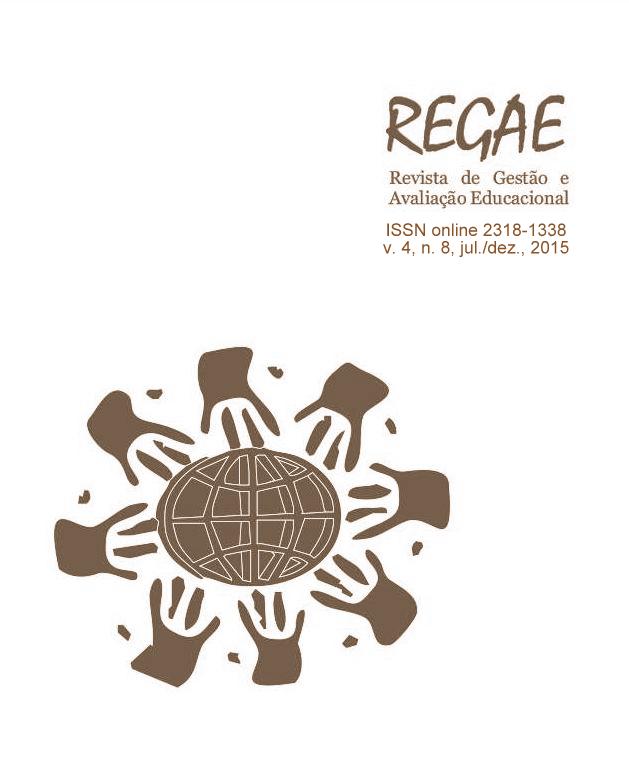Democratic management and political pedagogical project: case study on a Municipal School of São Gonçalo dos Campos - BA
DOI:
https://doi.org/10.5902/2318133816023Abstract
This work aimed to make a discussion on Democratic and Political Pedagogical Project Management, with a main objective to analyze how the process of collective construction of PPP in a teaching unit occurs. The survey was conducted in a public school in São Gonçalo dos Campos - BA, being developed through a case study with questionnaires involving teachers, manager and coordinator. The work is divided into two parts. The first consists of a literature review covering the various aspects of democratic management and Political Pedagogical Project. The second part consists of the presentation of the results of a case study. The survey revealed that at the school, the PPP is not drawn collectively and there is a very limited school community participation in the management process.
Key-words: political pedagogical project, democratic management, collective construction.
Downloads
References
BRASIL. Lei n. 9.394, estabelece as diretrizes e bases da educação nacional. Brasília: DOU, 1996.
BUSS, Rosinete Bloemer Pickler. Gestão escolar: cadernos de estudos. Indaial: Asselvi, 2008.
COMER, James P. Home-school relationships as they affect the academic success of children. Education and Urban Society, n. 16, 1984, p. 323-337.
GADOTTI, Moacir. O projeto político-pedagógico na escola: na perspectiva de uma educação para a cidadania. Brasília: Cortez, 1994.
GADOTTI, Moacir. Escola cidadã. São Paulo: Cortez, 1995.
GADOTTI, Moacir. Pressupostos do projeto pedagógico. CONFERÊNCIA NACIONAL DE EDUCAÇÃO PARA TODOS, 1, 1994. Anais ... Brasília: MEC, 1994.
LUCK, Heloísa. A gestão participativa na escola. Rio de Janeiro. Vozes, 2010.
LUNARDI, Geovana Mendes. A função social da escolarização básica: reflexões sobre as práticas curriculares da escola. CONGRESSO LUSO-AFRO-BRASILEIRO DE CIÊNCIAS SOCIAIS, 8, 2004. Anais ... Coimbra: Universidade de Coimbra, 2004.
MOREIRA, Antônio Flávio; SILVA, Tomaz Tadeu (org.). Currículo, cultura e sociedade. São Paulo: Cortez, 1997.
PARO. Vitor Henrique. Gestão democrática da escola pública. São Paulo: Ática. 2000
ROSENAU, Claudete Romualda. Ação do gestor escolar: estudo de caso com o desenvolvimento de proposta pedagógica. Florianópolis: UFSC, 2002. 99f. Dissertação (mestrado em Engenharia de Produção). Universidade Federal de Santa Catarina.
SAVIANI, Dermeval. O choque teórico da politecnia. Revista Trabalho, Educação e Saúde, Rio de Janeiro, v. 1, n. 1, 2003, p. 131-152.
SILVA, Maria Abadia. Do projeto político do Banco Mundial: ao projeto político-pedagógico da escola pública brasileira. Cad. Cedes, Campinas, v. 3, n. 61, 2003, p. 283-301.
VASCONCELLOS, Celso Santos. Planejamento: projeto de ensino-aprendizagem e projeto politico-pedagógico. São Paulo: Libertad. 2000.
VASCONCELLOS, Celso Santos. Coordenação do trabalho pedagógico: do projeto político-pedagógico ao cotidiano da sala de aula. São Paulo: Libertad, 2004.
VASCONCELLOS, Celso Santos. Projeto político-pedagógico: educação superior. Campinas: Papirus, 2004.
VEIGA, Ilma Passos Alencastro. Projeto político-pedagógico da escola: uma construção possível. Campinas: Papirus, 2009.
Downloads
Published
How to Cite
Issue
Section
License
Authors keep copyright and concede to the magazine the right of first publication, with the work simultaneously licensed under the Creative Commons Attribution 4.0 International, non-commercial license with no derivative work, which allows to share the work with no author recognition and initial publication in this magazine.
Authors has authorization to overtake additional contracts separately, to distribute a non-exclusive version of the work published in this magazine: For example: to publish in an institutional repository or as a chapter of a book, with authorial recognition and initial publication in this magazine.
Authors are allowed and are encouraged to publish and distribute their work online. For example: in institutional repositories or in their own personal page – at any point before or during the editorial process, because this can result in productive changes, as well as increase the impact and the mention to the published work.






